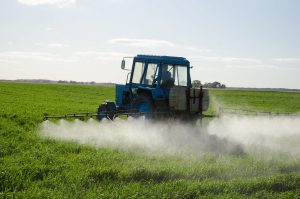The latest episode of Costing the Earth on Radio 4 looked at the links between current farming practices and why we’re losing so many insects:
The VGS news pages have also covered the issue:
It might be a question of ‘balance’, as reported by the Farming Futures:
Farming not about ‘with or without’ chemicals
Farming not about ‘with or without’ chemicals, says AHDB

Tractor Fertilize Field Pesticide And Insecticide | Tractor … | Flickr
The farming industry consultants AHDB looks at ‘an integrated approach’:
Integration, the key to managing pests, weeds and diseases
Sunday, 26 May 2019
Collaboration will help industry adopt a fully integrated approach to managing pests, weeds and diseases, to support sustainable farming in the long-term, according to AHDB.
To produce sufficient and safe food for a growing population, chemical usage has become an intrinsic part of farmers’ and growers’ toolkit. However, that toolkit is rapidly decreasing as substances are banned while public perception that all chemicals are bad for the environment grows.
And, while sustainable farming is increasingly challenging – in theory a future without pesticides could be possible; though this is unlikely to happen in the near future so the wider industry must adopt a fully integrated approach.
As our Head of Crop Protection Jon Knight, said: “Our farmers are more than aware that there are hundreds of species of weeds, diseases and plant-eating insects, which severely impact farmers’ ability to produce high quality food. Additionally, those pests are developing resistance to existing crop protection measures.
“There are now fewer tools to protect crops and we expect this decline to continue. An integrated approach to managing pests and diseases will no longer be an option, but a mandate to operate…”